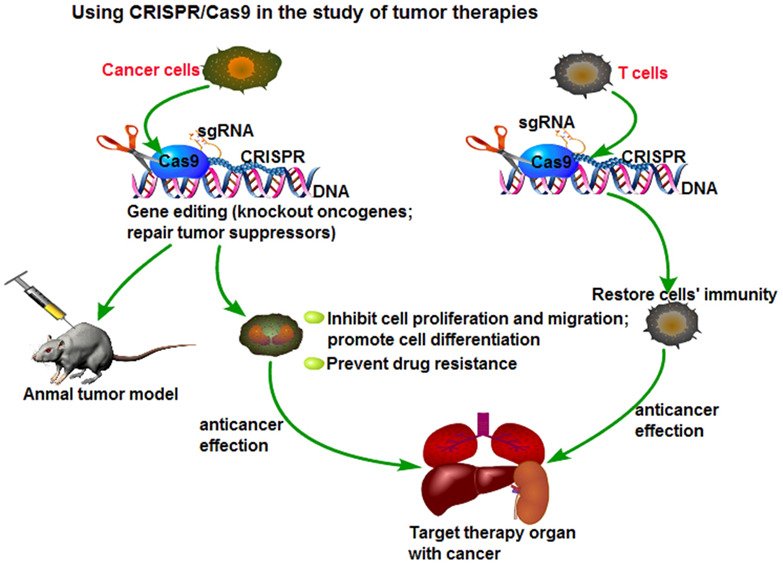The fight against cancer has been ongoing since, well, pretty much since human doctors realized that it was deadly. There have been many advancements in the battle against the disease, though a true cure has always seemed out of reach. Researchers at Tel Aviv University believe they are making progress toward that incredible goal with the help of the CRISPR genome-editing system.
As the scientists explain in a new paper published in Science Advances, the tool that was developed in the hopes of correcting potentially harmful genetic quirks may prove to be the ultimate tool for destroying deadly cancers. The team’s research has revealed that by using what they describe as a “novel lipid nanoparticle-based delivery system,” they can target cancer cells specifically and effectively kill them off with no chance that they will reactivate.
The description of how the system works to attack cancer cells sounds absolutely incredible. The scientists used the nanoparticles to send a message to the CRISPR enzyme Cas9 to target cancer cells and act “as a molecular scissors” to slice the cell’s DNA, killing it.
The researchers sought to prove that the system works by targeting glioblastoma and metastatic ovarian cancer, which are two of the cancers with the highest mortality rate. They’re notoriously aggressive cancers and claim many, many lives every year. When targeting these cancers in mice, a single treatment with the novel CRISPR system doubled the survival rate of the animals. That’s after just a single round of treatment, which is pretty incredible.
“This is the first study in the world to prove that the CRISPR genome editing system can be used to treat cancer effectively in a living animal,” said Professor Dan Peer, co-author of the research, said in a statement. “It must be emphasized that this is not chemotherapy. There are no side effects, and a cancer cell treated in this way will never become active again. The molecular scissors of Cas9 cut the cancer cell’s DNA, thereby neutralizing it and permanently preventing replication.”
Going forward, the researchers want to try their hand at tackling other kinds of diseases, including blood cancers and genetic diseases to see how much of a difference the gene-editing system can make. If the trials prove promising, we may soon see CRISPR used for a variety of ailments, and perhaps even as a promising tool for wiping out many types of cancers.

Scientists help immune system find hidden cancer cells
Cancer cells are masters at avoiding detection, but a new system developed by Yale scientists can make them stand out from the crowd and help the immune system spot and eliminate tumors that other forms of immunotherapies might miss, the researchers report in the journal Nature Immunology. The new system reduced or eliminated melanoma and triple-negative breast and pancreatic tumors in mice, even those located far from the primary tumor source, the researchers report. “This is an entirely new form of immunotherapy,” said Sidi Chen, assistant professor of genetics and senior author of the study.
Immunotherapy has revolutionized the treatment of cancer but existing therapies don’t work on all patients or not at all against some cancers. Existing therapies sometimes fail to recognize all molecular disguises of cancer cells, rendering them less effective. To address those shortcomings, Chen’s lab developed a new system that weds viral gene therapy and CRISPR gene-editing technology. Instead of finding and editing pieces of DNA and inserting new genes, the new system — called Multiplexed Activation of Endogenous Genes as Immunotherapy (MAEGI) — launches a massive hunt of tens of thousands of cancer-related genes and then acts like a GPS to mark their location and amplify the signals.
MAEGI marks the tumor cells for immune destruction, which turns a cold tumor (lacking immune cells) into a hot tumor (with immune cells). It is the molecular equivalent of dressing tumor cells in orange jump suits, allowing the immune system police to quickly find and eradicate the deadly cells, Chen said. “And once those cells are identified, the immune system immediately recognizes them if they show up in the future,” Chen said. The new system in theory should be effective against many cancer types, including those currently resistant to immunotherapy, he said. Upcoming studies will optimize the system for simpler manufacturing and prepare for clinical trials in cancer patients.
In addition, our own cells also help cancer. Dr Cathy Tournier, based at the University of Manchester, recently discovered that tumors can attract and help grow a type of cell found in our body which helps the tumor hide from the immune system. Her team found that this was reliant on the cancer cells producing a special molecule that they say could be blocked with targeted drugs, allowing the immune system to recognize and kill off cancer cells.



